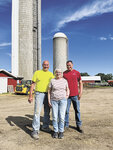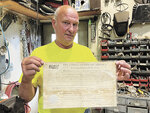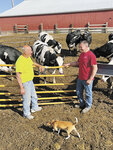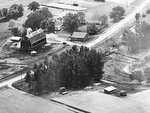



MELROSE, Minn. — Marv Thielen has a vague memory from the late 1950s when he was about 3 years old and the last of the horses left his family’s farm near Melrose. At the time, the farm had already been in his family for 90 years, ever since his great-grandfather, John Thielen, homesteaded the site in 1869. Through the years, tractors had replaced horses as the heavy lifters, and the animals were no longer needed.
“When they loaded up the last horses by the barn, I hid behind stacked wood they had there and watched,” Marv said. “I can just remember it.”
Long before Marv was born, the farm had sported a metal-wheeled tractor of some unknown make and model that is evident now only through old, grainy photos. By the time Marv hid behind the wood pile to watch the horses leave, the farm had upgraded to a 1949 8N Ford — now the oldest tractor on the farm — and also had recently added an even newer tractor that still has special meaning for Marv.
“I have a 1956 800 Ford at my lake home right now,” Marv said. “Dad bought that when I was born that year, so it’s a little keepsake for me.”
Stories, memories and old relics take on rich meaning when they come from a farm that has been in the same family for over a century and a half. Although Marv and his wife, Judy, now live off the farm and are retired, they still come to the farm every day to help their son, Chad, who owns and operates the farm as the fifth generation.
Chad and his wife, Jacki, purchased the farm in 2020 and live in the house there with their 6-year-old twins, Ray and Addy. It is the same house in which each generation of Thielens has lived since it was built in 1889 — although it has been remodeled and upgraded numerous times.
Today, Chad carries on the family farming tradition, milking 68 Holsteins in a tiestall stanchion barn and growing crops on 340 acres. He also raises all his own youngstock and finishes his steers. However, there was a time when the continuance of the farm was uncertain.
When Marv and Judy were considering retirement, none of their four children — Chad, Kelly, Stacy and Brian — seemed interested in taking over.
“I had told the kids that before I would let any of them come back to the farm, they would have to get a job off the farm and see what it was like working for somebody else,” Marv said. “If that ended up being the route they wanted to go, then they could go that route. I wasn’t going to force anyone to take over.”
Marv and Judy kept on farming while Judy also worked off the farm doing transcription at a nearby hospital and later a clinic. Their children grew up and went into other professions. It was looking like the family farm might be heading toward its end.
Then Chad and Jacki became the parents of twins, and Chad began to reconsider options for his young family.
“I had been working in St. Martin for 16 years at Rotochopper,” Chad said. “When (my parents) were talking about retiring, I just didn’t want to see the farm go away.”
It was in 2017 while Chad and Marv were driving home from the Central Plains Dairy Expo in Sioux Falls, South Dakota, that Chad told his dad he was interested in purchasing the farm.
“Chad wanted to come back,” Marv said. “I was hoping it was going to be that way. I still get emotional when I think about it because I wanted the legacy to keep going.”
Marv and Judy began to build their retirement home on lake property they owned, knowing the farm begun by John Thielen so long ago would continue in Chad’s capable hands.
When John Thielen came from Germany to the U.S. in 1867, he went through Ellis Island and spent time in Wisconsin before choosing Minnesota to pursue his dream of starting a farm. He homesteaded the first 160 acres of the current farm site near Melrose. There he dairy farmed and raised a family with his wife, Gertrude.
The couple’s son, Henry, and his wife, Katherine, eventually took ownership of the farm. Katherine outlived Henry and died in 1936. The farm then passed to their four sons: Raymond, Linus, Paul and Ben. When Paul died a month after his mother, the remaining three brothers farmed together. By the early 1970s, Raymond, who was Marv’s father, had bought out his brothers and was the sole owner with his wife, Verena.
Marv grew up milking cows and working on the farm with his parents and siblings. Then, his dad sold the milking herd in 1968 when Marv’s older brother enlisted in the military. At that time, they had been milking in an old domed-roof barn that had been damaged by several tornadoes through the years, and they finally gave up on fixing it. Raymond built the current barn in 1972 and fit it for raising hogs and beef cattle.
“The barn was 40-by-80 feet with hogs on one side of it and some pens with beef cattle on the other side,” Marv said. “It had all dirt floors and just some feed alleys.”
Marv graduated in 1975 without having any intention of taking over the farm. Instead, he took a job with Kraft Foods Group Inc. and later worked on a neighbor’s farm, but he grew dissatisfied. He missed the freedom of working on his own family farm, he said, and being his own boss.
“I thought, ‘This isn’t going to work,’” Marv said. “I was getting married, so I started back home in 1981.”
He also reintroduced dairy cows to the farm after a 13-year hiatus.
“In 1981, we started redoing the barn,” Marv said. “I gutted that out, put in 16 stalls and bought 22 cows.”
Marv did the remodeling of the barn himself, even mixing the cement. He and Judy began milking cows in the new setup that fall.
“We switched cows and cleaned the barn by hand for the first year,” Marv said. “The next year, I put in another 16 stalls, and then we put in a barn cleaner. We milked that way for quite a while.”
Judy, who did not grow up on a farm, faced a bit of a learning curve in the beginning.
“I didn’t know the back end of a cow from the front end,” Judy said. “We had horses when I was growing up. My dad was a big horse guy.”
However, it did not take long for Judy to adapt to farm life.
“I liked animals, so that was plus, and I just took to it,” Judy said. “When people I knew from high school would see me a few years later, they would say, ‘You milk cows? I never thought you’d do that.’”
She continued her job off the farm as well, so life was busy as they raised their family, and they needed to work as a team. One day, a few weeks after Chad was born, Judy came home from work and headed to the barn to help Marv with chores. When she arrived, she did not see Chad anywhere and asked Marv where he was.
“I told her that he was in a warm, safe place,” Marv said. “Those vat sinks in the milk house are a perfect little crib. I had moved the faucets to the side and laid him in there. He couldn’t go anywhere, but it was nice and warm.”
By 1987, the couple purchased the farm from Verena since Raymond had passed away. They continued to tear down old buildings, add new facilities and upgrade.
“We did a lot of building,” Marv said. “The only thing that’s still here that is original is the house.”
They also put in a manure pit and began renting a neighboring farm, which made room for raising more cattle.
Looking back, Marv and Judy said many things have changed on the farm during their time there, yet the important things have remained the same.
“It’s still a family farm,” Judy said. “It was a good place to raise kids. We were together a lot.”
Marv agreed.
“It’s still owned and operated by the family,” he said. “I always told the kids, ‘Since it’s a family farm, everybody works together; everyone gets to do something.’”
Marv noted that if one or both of Chad’s children choose to take over the operation someday, they would most likely see the farm reach the 200-year milestone — but that remains to be seen.
“They are only 6 years old,” Chad said. “They like being out here, and I get them to help in the barn, but we have a lot of time yet.”
For now, he said, he is enjoying his choice to come back.
“I like the freedom — you can do what you want to do as long as you get your stuff done,” Chad said. “I’m glad that (my coming back) keeps the family farm going.”
Comments
No comments on this item Please log in to comment by clicking here